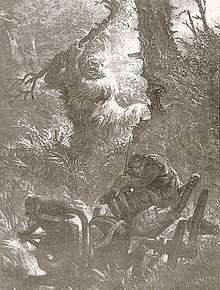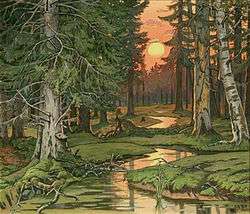Leshy
The Leshy (also Leshi; Russian: леший, IPA: [ˈlʲeʂɨj]; literally, "[he] from the forest", Polish: boruta, borowy, leśnik, leśniczy, lasowik, leszy) is a tutelary deity of the forests in Slavic mythology. The plural form in Russian is лешие, leshiye (retaining the stress on the first syllable). As the spirit rules over the forest and hunting, he may be related to the Slavic god Porewit.[1][2]
.jpg) An illustration, 1906 | |
| Grouping | Tutelary deity Spirit |
|---|---|
| Country | Slavic Europe |
There is also a deity, named Svyatibor (Svyatobor, Svyatibog), who is mentioned in the beliefs of the Eastern and Western Slavs as the god of forests and the lord of the leshies. His functions were identical to those of the god Veles.[3]
The Leshy is masculine and humanoid in shape, is able to assume any likeness[4] and can change in size and height.[5][6] He is sometimes portrayed with horns and surrounded by packs of wolves and bears.[1] In some accounts, Leshy is described as having a wife (Leshachikha, Leszachka, Lesovikha and also, sometimes, the Kikimora of the swamp) and children (leshonki, leszonky). He is known by some to have a propensity to lead travelers astray and abduct children (which he shares with Chort, the "Black One"), which would lead some to believe he is an evil entity. He is, however, also known to have a more neutral disposition towards humans, dependent on the attitudes and behaviours of an individual person, or local population, towards the forest.[7] Leshy could take children who were cursed by their relatives (in particular, parents) away to the forest people.[8] Some would therefore describe him as more of a temperamental being, like a fairy.[9]
Names and etymology

The Leshy is known by a variety of names and spellings including the following:[10][11][12][13][14]
Main name variations:
- Borovoi (Russian: Боровой, Polish: Borowy) "[he] of the forest"
- Gayevoi (Russian: Гаевой, Polish: Gajowy) "[he] of the grove"
- Leshak (Russian: Лешак, Serbo-Croatian: Lešak, Лешак)
- Leshy (Russian: Леший, Belarusian: Лешы, Polish: Leszy, Serbo-Croatian: Lešij, Лешиј)
- Lesnik (Russian: Лесник, Polish: Leśnik, Bulgarian: Лесник, Serbo-Croatian: Lesnik, Лесник)
- Lesovik (Russian: Лесовик, Belarusian: Лесавік, Ukrainian: Лісовик, Serbo-Croatian: Lesovik, Лесовик)
- Lesovoi (Russian: Лесово́й, Serbo-Croatian: Lesovoj, Лесовој)
- Lesun (Russian: Лесун, Belarusian: Лясун)
- Mezhsargs (Latvian: Mežsargs) "forester"
- Mishkinis (Lithuanian: Miškinis) "woodsman"
- Mishko velnias (Lithuanian: Miško velnias) "forest devil"
- Vir'ava (Erzya: Вирьава) "forest mother"

Euphemistic titles:
- He (Russian: он) also used for the devil, based on superstition prohibiting invocation of evil
- He himself (Russian: он сам) like "he"[9]
- Les chestnoi (Russian: Лес честной) "honorable one of the forest"
- Les pravedniy (Russian: Лес праведный) "righteous one of the forest"
- Lesnoi dedushka/ded or Dedushka-lesovoi (Russian: Лесной дедушка/дед, Дедушка-лесовой, Belarusian: Лясны дзед, Polish: Leśny dziad) "forest grandfather"
- Lesnoi dukh (Russian: Лесной дух) "forest spirit"
- Lesnoi dyadya (Russian: Лесной дядя) "forest uncle"
- Lesnoi khozyain (Russian: Лесной хозяин) "forest master"
- Lesnoi zhitel' (Russian: Лесной житель)"forest dweller" or "woodsman"
- Lesny muzhik , "forest man"
In popular culture

- Leshiy is used as a prototype for the main character of Vladimir Vysotsky's song "Lukomorye", where leshy is depicted as an alcoholic that spends all his money on drinking and is abusive against his wife.[8]
- Leshiy is mentioned in the prologue of Alexander Pushkin's poem "Ruslan and Lyudmila": "…There are miracles: there the leshiy wanders…" (Russian: …Там чудеса: там леший бродит…)
- "Leszy" is one of the monsters featured in Andrzej Sapkowski's fictional world of The Witcher. It appears in the video game The Witcher 3, created by CD Projekt Red based on Sapkowski's novels, where its name is translated as "Leshen" in the English edition. This version also appears in a crossover in Monster Hunter: World.
- "Leshiy" [Леший] is a song by the Russian metal band Arkona from their 2011 album Slovo.
- "Leshy" character in the 1994 computer game Quest for Glory: Shadows of Darkness by Sierra Entertainment
- The Wood Demon [Леший] (1889) is a four-act comedy by Anton Chekhov.
- "Leshii" is a shapeshifting pagan god featured in season 5 of Supernatural.
- "Leshii" is a character that appears as a bear-like spirit in the 2007 comic Hellboy: Darkness Calls in which he lets Hellboy take cover from Baba Yaga in his forest for one night.
- Leshii appears in the digital card game Cabals: Magic & Battle Cards.
- The deity in the movie The Ritual highly resembles the Leshy. The leshy is a spirit or an entity that lives and hunts in the forest.
- Leshy is a titular character and a behind the scene villain in the film The Woodkin. It is presented as a stag in its prime.
- "Leshak" is a battleship-class vessel in the MMORPG Eve Online.
- Leshii is a forest god in the 2020 novel The Boatman's Daughter by Andy Davidson.
See also
| Wikimedia Commons has media related to Leshiy. |
| Look up leshy in Wiktionary, the free dictionary. |
- Äbädä (Tatarstan)
- Basajaun (Basque Country)
- Berstuk (Wend people of Germany)
- Boruta (Slavic region)
- Grand Bois (loa) (Haiti)
- Ochopintre (Republic of Georgia)
- Jinn (Arabian, Islamic)
- Vörsa (Komi Republic)
- List of nature deities (Slavic mythology)
- Shatans (Belarus, Russian Federation)
- Shishiga (Russia)
- Silvanus (Ancient Rome and Gaul)
- Woodwose (medieval Europe)
- Yum Caax (Mayan)
- Hidebehind (Americas)
References
- Theresa Bane (9 January 2012). Encyclopedia of Demons in World Religions and Cultures. McFarland. p. 85. ISBN 978-0-7864-8894-0.
- Alexander Porteous (1 January 2005). The Lore of the Forest. Cosimo, Inc. p. 108. ISBN 978-1-59605-105-8.
- Kaysarov Andei Sergeevich (1810). Slavic and Russian mythology. DirectMEDIA. p. 245. ISBN 5998918851.
- Ushakov,Dmitry. (1896) Материалы по народным верованиям великоруссов, Этнографическое обозрение [Materials on the folk beliefs of the Great Russian, Ethnographic Review]. (Vol. 8), no. 2-3, pg. 158.
- Maksimov, S. V. (1912) Нечистая сила. Неведомая сила // Собрание сочинений [The Unclean Force, The Unknown Force, Collected Works]. pp. 79-80.
- Tokarev, Sergei Aleksandrovich. (1957) Религиозные верования восточнославянских народов XIX — начала XX века [The religious beliefs of the peoples of East 19th – early 20th centuries]. AN SSSR Moscow and Leningrad. p. 80.
- Barbara., Podgórska (2005). Wielka księga demonów polskich : leksykon i antologia demonologii ludowej. Podgórski, Adam. Katowice: Wydawn. KOS. ISBN 8389375400. OCLC 62151653.
- "Mythological Creatures | Leshy". History & Culture Academy of Latgale.
- Ivanits, Linda J. (1989) Russian Folk Belief. Routledge. p. 68 ISBN 0-873-32889-2
- Afanasyev, Alexander Nikolayevich. (2013) Поэтические воззрения славян на природу [The Poetic Outlook of Slavs About Nature]. Akademicheskii Proyekt. Moscow. ISBN 978-5-8291-1451-0 ISBN 978-5-8291-1461-9
- Afanasyev, Alexander Nikolayevich. (1983) Древо жизни и лесные духи [The Tree of Life and Forest Spirits]. Sovremennik. Moscow.
- Afanasyev, Alexander Nikolayevich. (2008) Славянская мифология [Slavic Mythology]. Eksmo, Migard. Moscow. ISBN 978-5-699-27982-1
- Krinichnaya, Neonila Artyomovna. (2004) Русская мифология: Мир образов фольклора [Russian Mythology: The World of Folklore Images]. Akademicheskii Proyekt. Moscow. ch. 3, "Leshy: Totemic origins and the polysemy of images". ISBN 5-8291-0388-5 ISBN 5-98426-022-0
- Levkievskaya, Elena E. (2011) Мифы русского народа [Myths of the Russian People]. AST, Astrel, VKT. Chapter "Leshy". ISBN 978-5-17-072533-5 ISBN 978-5-271-33771-0 ISBN 978-5-226-03926-3